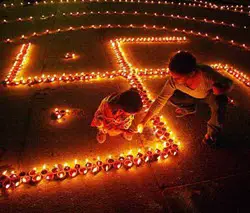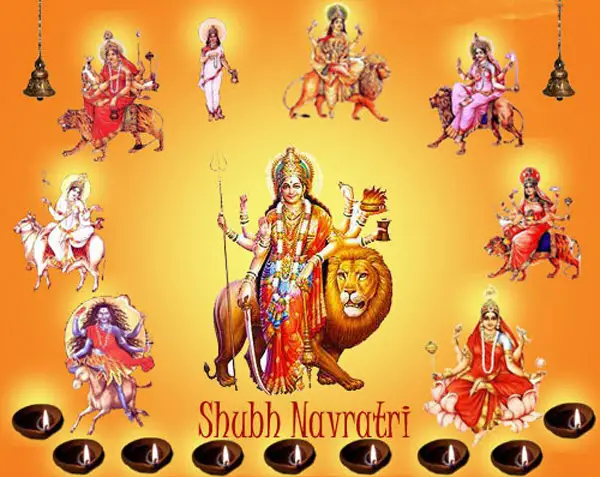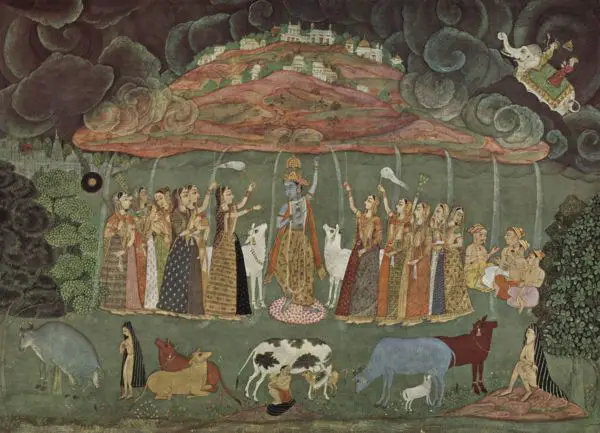Mauni Amavasya, also known as ‘Mauna Amavasya’ and ‘Bhomavati Amavasya,’ is a very ancient and unique Hindu tradition observed on the ‘no moon day’ (Amavasya) in the Hindu month of Magha.
This Amavasya usually falls in January or February, according to the Gregorian calendar. Mauni Amavasya is often referred to as ‘Maghi Amavasya’ as it is celebrated during the month of Magha.
On the auspicious day of Mauni Amavasya, Hindus practice silence throughout the day based on the principles listed in the ancient Hindu science of Yoga. In fact, the word ‘Mauni’ signifies silence. Therefore, most Hindus observe complete silence on this day.

They also keep a full-day fast on the auspicious day of Mauni Amavasya. It is said that fasting on Mauna Amavasya’s day helps to attain virtues from the deities and the ancestors get peace. Hindus believe that all the Gods (Devas) gather on the sacred Ghats of the ‘Sangam.’ So, there’s the special significance of having a holy bath in the Ganges. It is known as “Mauni Amavasya Snana,” which is predominant during the Kumbh Mela and Magha Mela.
Mauni Amavasya has a deep spiritual significance. The day is dedicated to Spiritual Sadhana. The Hindu Yogis and Rishis observe the day for getting peace, happiness, bliss, and liberation. They observe silence and practice deep meditation. It is also believed that Sage Manu was born on the auspicious day of Mauna Amavasya.
Although Amavasya is very popular in different parts of the country, it has attained a special significance in northern India. Mauni Amavasya is widely popular in Allahabad in the state of Uttar Pradesh.
It is the most important day for having a holy dip in the Ganges during the world-famous Kumbh Mela in Prayag (Allahabad). The day is often referred to as ‘Amrit Yoga’ and ‘Kumbh Parva.’
However, Mauni Amavasya celebrations are also very popular in Andhra Pradesh, where it is celebrated as “Chollangi Amavasya.” Mauni Amavasya is also known as “Darsh Amavasya” in other parts of India.
So, Mauna Amavasya is a very auspicious day in the Hindu religion for attaining knowledge, peace, happiness, and liberation.
Table of Contents
Mauni Amavasya Katha
The Hindu Puranas sing praises of the auspicious day of Mauni Amavasya. A significant event is known as the ‘Samudra Manthan’ Katha, which describes the significance of ‘Sangam Snana’ on Mauna Amavasya. Here, we briefly describe the event that led to the importance of “Sangam Snana” on Mauni Amavasya as described in the Puranas.
During the pre-historic era, all the Devas and Asuras gathered for the famous exercise known as the ‘Samudra Manthan.’ It was performed to get the divine ‘nectar’ (Amrit), which blesses the soul with immortality, other precious jewels, and priceless items.
When the Samudra Manthan was in progress, Lord Dhanvantari appeared holding the ‘Amrit Kalash,’ which contained the divine nectar drinking of which one could become immortal. An immense battle arose between the Devas and Asuras for this “Amrit Kalash.” During this fight, some of this divine nectar fell in Prayag, Haridwar, Nasik, and Ujjain.
Puranas say that whosoever takes a holy dip at the rivers along with these places on the day of Amavasya is blessed with immense purity (“Punya’s”) and gets the blessings of the Gods. The soul is purified, and life is filled with peace and happiness.
If it’s Mauni Amavasya on Monday, the importance is increased manifold. Moreover, if the day is Monday during Maha Kumbh, Mauna Amavasya’s importance is infinite.
It is mentioned in the Hindu Shaastra that having a “Sangam Snana” on Mauni Amavasya during Magha month blesses the devotee with infinite purity and peace of mind, and they attain liberation from the cycle of life and death.
So, one should take a dip in the holy rivers on the auspicious day of Mauni Amavasya. Hindus follow the custom of donating food, clothes, money, gold, land, and cows as per their ability. People also donate “til” on this day. They observe silence (Mauna Vrata) throughout the day and pray to Lord Vishnu and Bhagwan Shiva.
Sacred mantras are chanted throughout this day. There is a religious custom to worship the Peepal tree by giving “Arghya,” and lighting lamps are known as “deep daan.” People also observe a full-day fast on Mauna Amavasya.
Mauni Amavasya Significance
Mauni Amavasya glorifies the practice of silence (Maun) in the Hindu religion for attaining peace, self-control, liberation, and ultimate reunion with God.
By practicing Maun, one can transition from being a piece of creation to the source of creation. Maun, or the absence of sound, opens up a dimension that is beyond life and death. It leads us to experience the enormous presence of the source of creation.
Amavasya teaches us the importance of practicing silence and becoming silent. Hindu Yogic traditions have given immense importance to maintaining silence from Mauni Amavasya to Maha Shivratri.
Mauni Amavasya allows us to transcend the endless cycles of time and reunite with our true selves to experience Godhood and immortality by practicing silence.
In fact, Hindu Yogis and Rishis have used silence as an integral component of spiritual development. Moreover, the word “Mauni” is derived from the Sanskrit word “Muni,” which means a saint who practices silence.
So, “Maun,” or silence, was used to realize oneself. Many Hindu Gurus or Saints have given immense importance to practicing silence for spiritual attainment.
The tradition of Amavasya was used to practice silence to attain nirvana, freedom from the cycle of life and death.
Bathing in sacred rivers (such as the Ganges) on the auspicious day of Mauni Amavasya is considered another very important practice for Hindu followers. It is believed that the waters of the holy River Ganga turn nectar on Mauni Amavasya’s day.
So, devotees take a bath in the holy rivers on Amavasya. “Sangam Snana” holds immense importance for the devotees of Mauna Amavasya. Moreover, the whole month of Magha is considered ideal for bathing rituals in sacred rivers.
Rituals connected with Mauna Amavasya
- Devotees go for a holy dip in the Ganges at sunrise. However, if one cannot visit any pilgrimage destination, they can bathe at home by adding a little Ganga “Jal” to the bathing water. Devotees practice silence throughout the day and remain quiet.
- Once the bathing ritual is over, devotees sit down in meditation. It helps them to attain inner peace, silence, and happiness.
- Devotees do not speak any harsh words and avoid wrong or sinful actions. Moreover, they refrain from speaking and practice ‘Mauna Vrata.’
- Devotees from different parts of India gather in Prayag for the “Sangam Snana” on Mauni Amavasya in the month of Magha.
- Mauni Amavasya is also considered highly appropriate for relieving Pitru Dosha. So, people offer “Tarpan” to their Pitrs to seek their blessings and ask for forgiveness. They offer the poor and needy food, clothes, and other essentials. There’s even a ritual of offering sesame (til) oil to Lord Shani Deva.
Mauni Amavasya Date 2025
Mauni Amavasya is the day of silence when Hindus pledge not to utter a word throughout the day. Devotees go for a holy dip in sacred rivers such as the Ganges.
Mauni Amavasya will be celebrated on 29th January 2025, Wednesday.
Amavasya Tithi Begins: 07:35 PM on 28th January 2025
Amavasya Tithi Ends: 06:05 PM on 29th January 2025
So, Mauni Amavasya is the day to practice silence and pray to God to attain knowledge, peace, health, and happiness.




